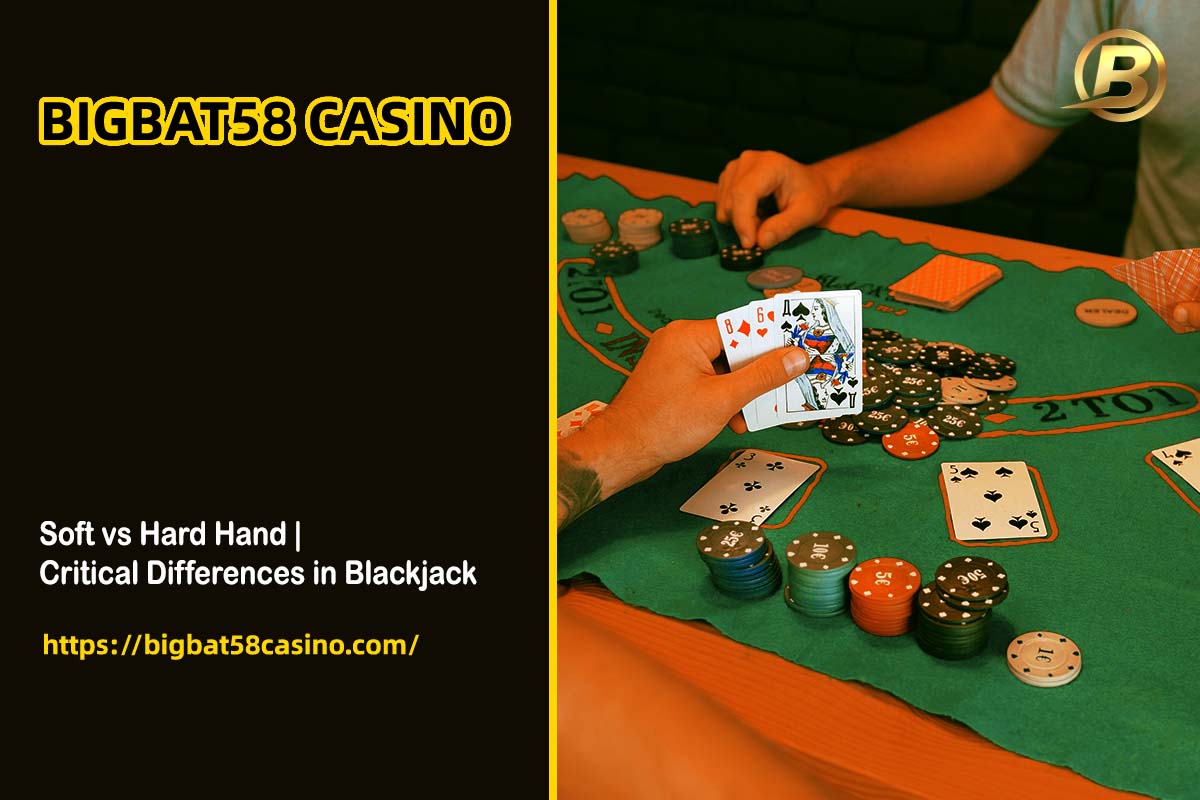Soft vs Hard Hand | Critical Differences in Blackjack
In blackjack, understanding the differences between a soft vs hard hand can drastically improve your game strategy. This guide will clarify the distinctions between a soft hand and a hard hand by explaining their implications and strategies. After grasping these concepts, you’ll be better equipped to make informed decisions and enhance your gameplay. Let’s dive into the key differences and strategies for both hand types.START GAME
Read more articles:
Bigbat Blackjack Soft vs Hard Hand Guide: What is Hand?
In blackjack, a hand starts with two initial cards dealt to the player. These cards form the foundation for all subsequent moves such as hitting, standing or doubling down. The value of your hand is calculated as follows. Number cards (2-10) are worth their face value. Face cards (King, Queen, Jack) are each worth 10 points. The Ace can be worth either 1 or 11 depending on which value benefits the player most. This flexibility in the Ace’s value is crucial in differentiating between a soft vs hard hand.
What is Soft hand in Blackjack?
A soft hand in blackjack includes an Ace valued as 11, which makes the hand less risky since the Ace can also be counted as 1 if needed. For example, if you have an Ace and a 7, you have a soft 18. If you draw a third card that causes the total to exceed 21, the Ace can be revalued as 1 to prevent a bust. This flexibility makes a soft hand valuable because it reduces the risk of busting compared to a hard hand.
In Bigbat Blackjack, having a soft hand allows you to play more aggressively. For instance, a soft 18 (Ace and 7) against a dealer’s 4, 5 or 6 might encourage you to double down as the dealer’s weaker cards increase the chances of a favorable outcome. If you end up with a soft hand, the risk of busting is lower and allows you to strategize more effectively.
How to Play Soft Hand?
When you’re holding a soft hand in blackjack, the goal is to leverage its flexibility. For example, if the dealer shows a 4, 5, or 6, doubling down on a soft hand can be a strong strategy since you’re less likely to bust. This approach can further lower the house edge and increase your chances of winning.
However, if the dealer hits a soft 17 (an Ace and a 6), it can impact your strategy since the dealer has a chance to improve their hand. Despite this, a well-played soft hand still provides significant advantages and should be used strategically to maximize your potential gains.
What is Hard hand in Blackjack?
A hard hand in blackjack is one where an Ace counts only as 1 or where there is no Ace at all. For example, a hand with a 10 and a 6 totals 16, making it a hard hand. If you have an Ace and a 10, counting the Ace as 1 keeps your hand from busting if you draw additional cards.
In contrast to a soft hand, a hard hand is more rigid because it lacks the flexibility of revaluing an Ace. For instance, if you have a hard 16 (10 and 6), drawing another card risks busting and makes this a more precarious situation compared to a soft hand.
How to Play Hard Hand?
For a hard hand, the strategy varies based on the total value of your hand and the dealer’s up-card. If your total is 9 and the dealer shows a 3, 4, 5, or 6, doubling down is usually advisable. For totals of 10 or 11, always double down unless the dealer shows a 10 or Ace. For a total of 12, hit unless the dealer’s card is 4, 5, or 6 in which case standing is preferable.
Always stand when your total is 17 or higher. For totals of 13 through 16, stand if the dealer shows 2 through 6. Otherwise, hit to improve your hand. Understanding these strategies in Bigbat Blackjack can help you make more effective decisions and better manage your risk.
When to double down a soft and hard hand?
Doubling down involves increasing your bet and receiving only one more card. With a hard hand, this is generally risky and should be done with a total of 9 or 10, provided the dealer’s card is low. For a soft hand, doubling down on 16, 17 or 18 is beneficial when the dealer shows a low card. This strategy can significantly enhance your position if used correctly.
Conclusion
Differentiating between a soft vs hard hand in blackjack is crucial for refining your strategy and improving your chances of winning. By understanding the advantages and strategies associated with the soft hand in blackjack and applying them effectively in games, you can make more informed decisions and enhance your overall gameplay with greater confidence and skill.











